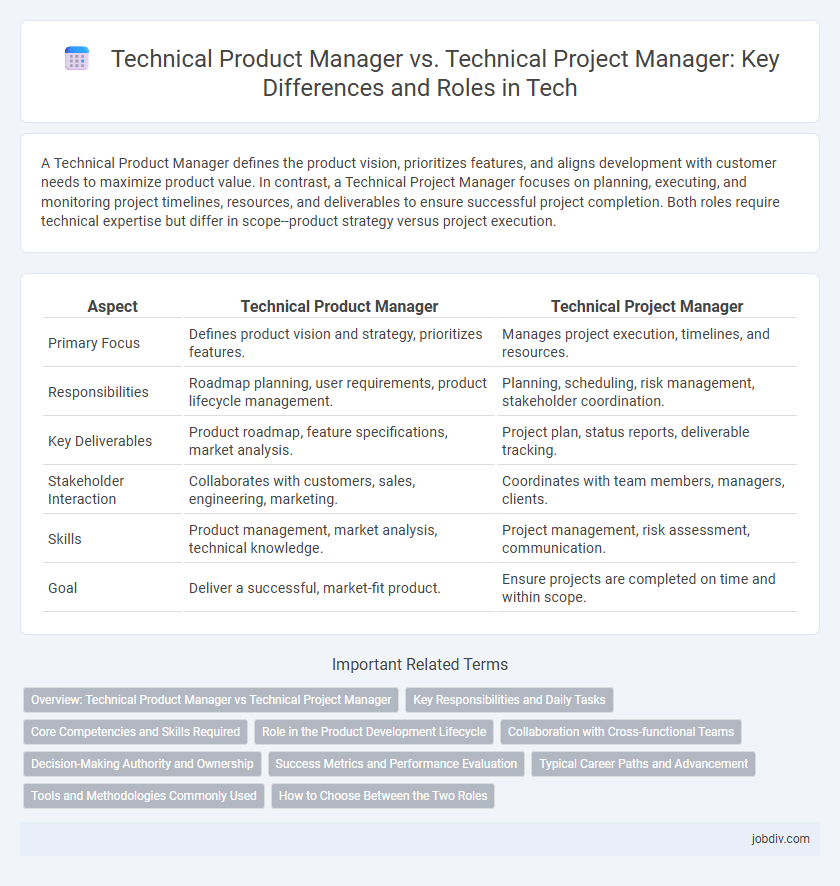A Technical Product Manager defines the product vision, prioritizes features, and aligns development with customer needs to maximize product value. In contrast, a Technical Project Manager focuses on planning, executing, and monitoring project timelines, resources, and deliverables to ensure successful project completion. Both roles require technical expertise but differ in scope--product strategy versus project execution.
Table of Comparison
| Aspect | Technical Product Manager | Technical Project Manager |
|---|---|---|
| Primary Focus | Defines product vision and strategy, prioritizes features. | Manages project execution, timelines, and resources. |
| Responsibilities | Roadmap planning, user requirements, product lifecycle management. | Planning, scheduling, risk management, stakeholder coordination. |
| Key Deliverables | Product roadmap, feature specifications, market analysis. | Project plan, status reports, deliverable tracking. |
| Stakeholder Interaction | Collaborates with customers, sales, engineering, marketing. | Coordinates with team members, managers, clients. |
| Skills | Product management, market analysis, technical knowledge. | Project management, risk assessment, communication. |
| Goal | Deliver a successful, market-fit product. | Ensure projects are completed on time and within scope. |
Overview: Technical Product Manager vs Technical Project Manager
A Technical Product Manager oversees the strategic vision, roadmap, and feature set of a technology product, aligning development with customer needs and business goals. In contrast, a Technical Project Manager focuses on planning, executing, and delivering specific technical projects within scope, budget, and timeline constraints. Both roles require deep technical knowledge, but product managers drive product lifecycle and value, while project managers ensure process efficiency and successful project completion.
Key Responsibilities and Daily Tasks
Technical Product Managers drive product vision, define feature requirements, and prioritize backlogs to align with market needs and business goals, ensuring continuous value delivery. Technical Project Managers focus on project planning, resource allocation, risk management, and timeline adherence to guarantee successful product development and deployment. Both roles require cross-functional collaboration, but the Product Manager steers the strategic direction while the Project Manager handles execution and operational efficiency.
Core Competencies and Skills Required
Technical Product Managers excel in market analysis, product lifecycle management, and stakeholder alignment, prioritizing user experience and business value. Technical Project Managers specialize in resource allocation, risk management, and timeline adherence, ensuring project delivery within scope and budget. Both roles demand strong communication, technical knowledge, and leadership skills but differ in focus: product strategy versus project execution.
Role in the Product Development Lifecycle
A Technical Product Manager defines the product vision, prioritizes features based on customer needs, and guides the product roadmap through the entire development lifecycle to maximize value delivery. In contrast, a Technical Project Manager focuses on planning, executing, and monitoring project timelines, resources, and risk management to ensure timely and efficient product delivery. Both roles collaborate closely during design, development, testing, and launch phases but maintain distinct responsibilities in strategic direction versus tactical execution.
Collaboration with Cross-functional Teams
Technical Product Managers align product vision with customer needs by collaborating closely with engineering, design, marketing, and sales teams to prioritize features and drive product development. Technical Project Managers coordinate tasks, timelines, and resources across engineering, QA, operations, and stakeholders to ensure successful project delivery within scope and budget. Effective collaboration between both roles enhances communication, accelerates problem-solving, and optimizes product outcomes in agile environments.
Decision-Making Authority and Ownership
Technical Product Managers hold primary decision-making authority over product vision, roadmap, and feature prioritization, ensuring alignment with market needs and business goals. Technical Project Managers own the execution process, managing timelines, resources, and cross-functional team coordination to deliver projects on schedule. The distinction lies in the Product Manager's strategic ownership versus the Project Manager's operational control and execution responsibility.
Success Metrics and Performance Evaluation
Technical Product Managers are evaluated primarily on success metrics such as product adoption rates, customer satisfaction scores, and revenue growth linked to product features, reflecting their ownership of the product lifecycle. Technical Project Managers are assessed on performance metrics including project delivery timelines, budget adherence, and resource allocation efficiency, emphasizing their role in executing project plans successfully. Both roles require data-driven evaluations but target distinct outcomes: product impact for TPMs and project execution excellence for TPjMs.
Typical Career Paths and Advancement
Technical Product Managers often advance by gaining expertise in market analysis, user experience, and product strategy, progressing to roles such as Senior Product Manager, Director of Product, or Chief Product Officer. Technical Project Managers typically follow a path emphasizing project execution, resource coordination, and risk management, leading to positions like Program Manager, PMO Director, or Operations Manager. Cross-functional skills in leadership, technical knowledge, and stakeholder management can accelerate advancement in both career tracks.
Tools and Methodologies Commonly Used
Technical Product Managers typically utilize tools like JIRA, Confluence, and Roadmunk for product backlog management, roadmapping, and stakeholder collaboration, applying Agile, Scrum, and Lean methodologies to prioritize features and deliver customer value. Technical Project Managers often rely on Microsoft Project, Smartsheet, and Trello to track timelines, resources, and budgets, employing Waterfall, Critical Path Method (CPM), and Risk Management frameworks to ensure project execution and delivery. Both roles integrate continuous improvement practices and use data analytics platforms, such as Tableau or Power BI, to monitor performance metrics and optimize workflows.
How to Choose Between the Two Roles
Choosing between a Technical Product Manager and a Technical Project Manager depends on whether the focus is on defining product vision and strategy or on managing project execution and timelines. A Technical Product Manager drives product development by aligning features with market needs and customer feedback, while a Technical Project Manager ensures the successful delivery of technology projects through resource coordination and risk management. Evaluating your strengths in strategic planning versus operational execution helps determine the optimal role for your career path.
Technical Product Manager vs Technical Project Manager Infographic

 jobdiv.com
jobdiv.com